鲁科五四制2024四年级英语上册期末提升测试卷(含答案)
文档属性
| 名称 | 鲁科五四制2024四年级英语上册期末提升测试卷(含答案) |
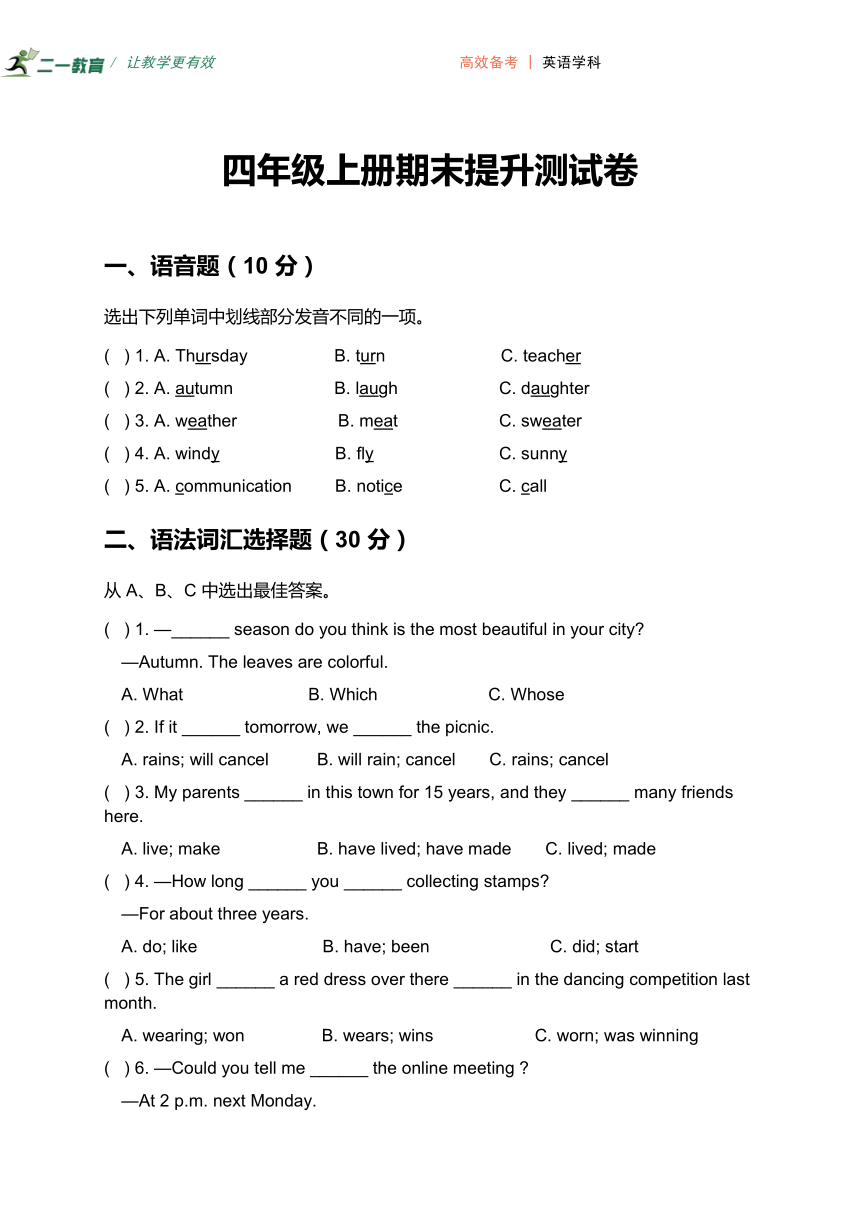
|
|
| 格式 | docx | ||
| 文件大小 | 43.0KB | ||
| 资源类型 | 试卷 | ||
| 版本资源 | 鲁科版(五四制) | ||
| 科目 | 英语 | ||
| 更新时间 | 2025-08-05 00:00:00 | ||
图片预览

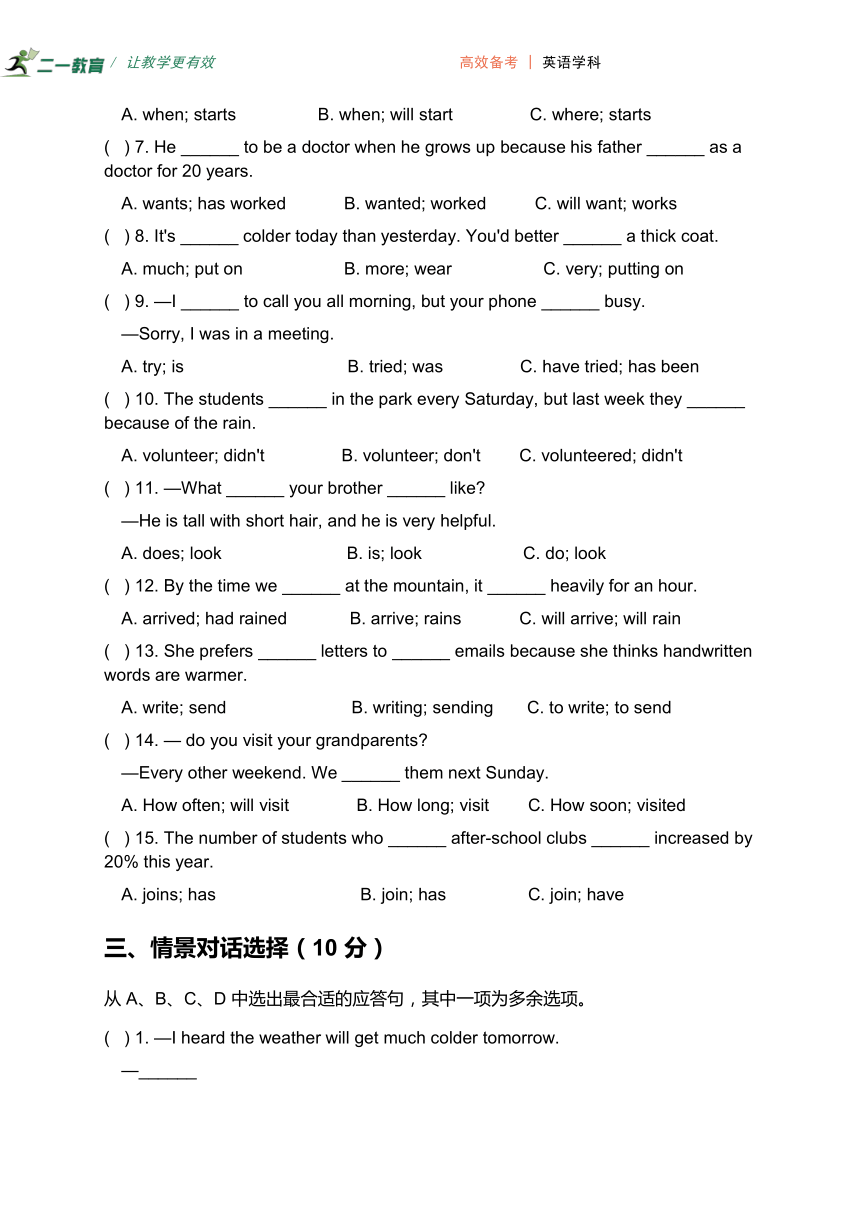
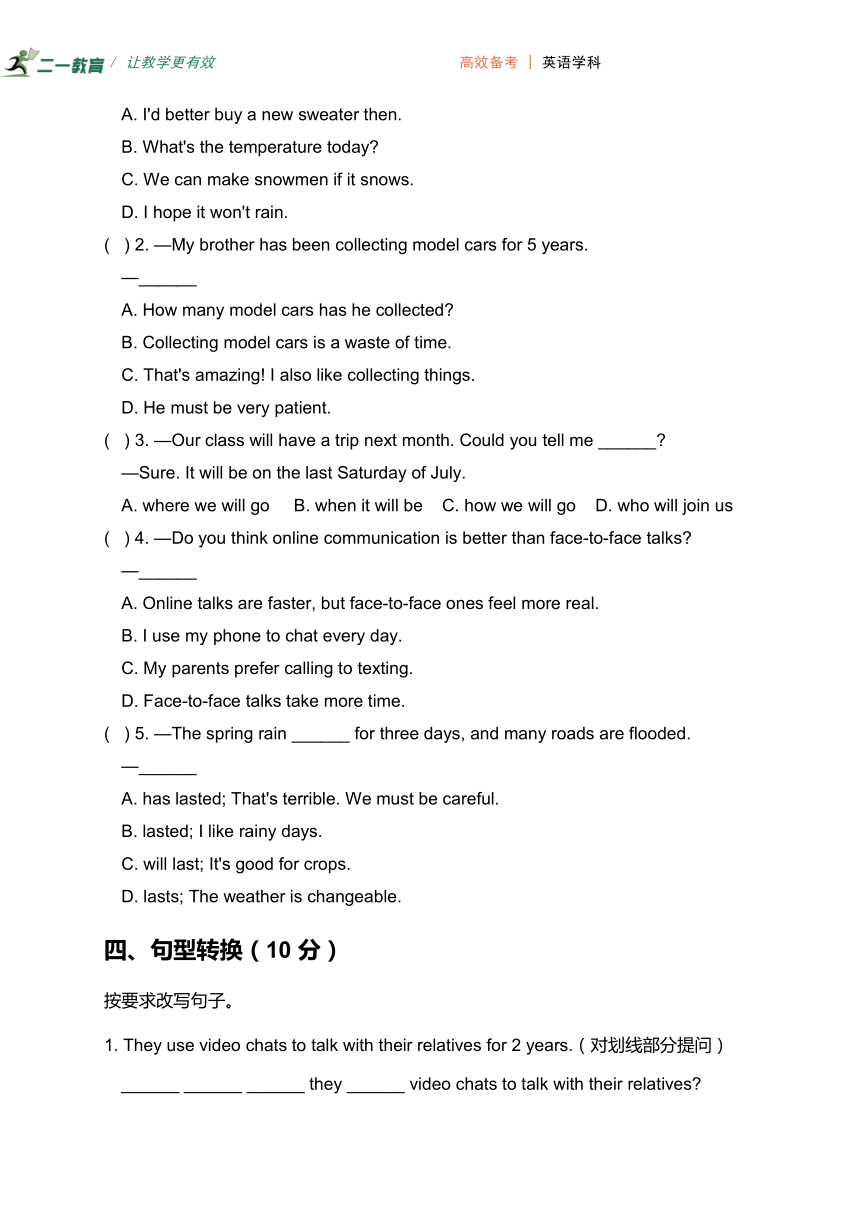
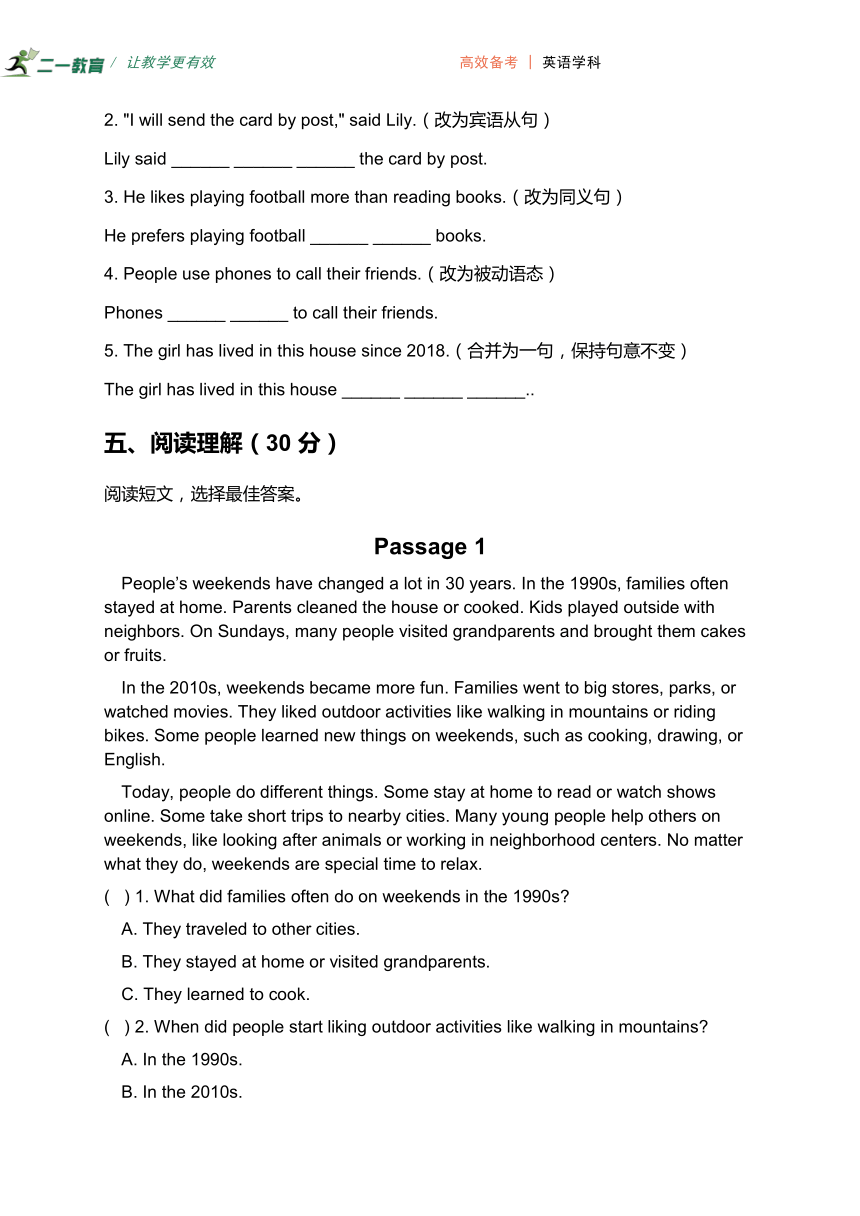
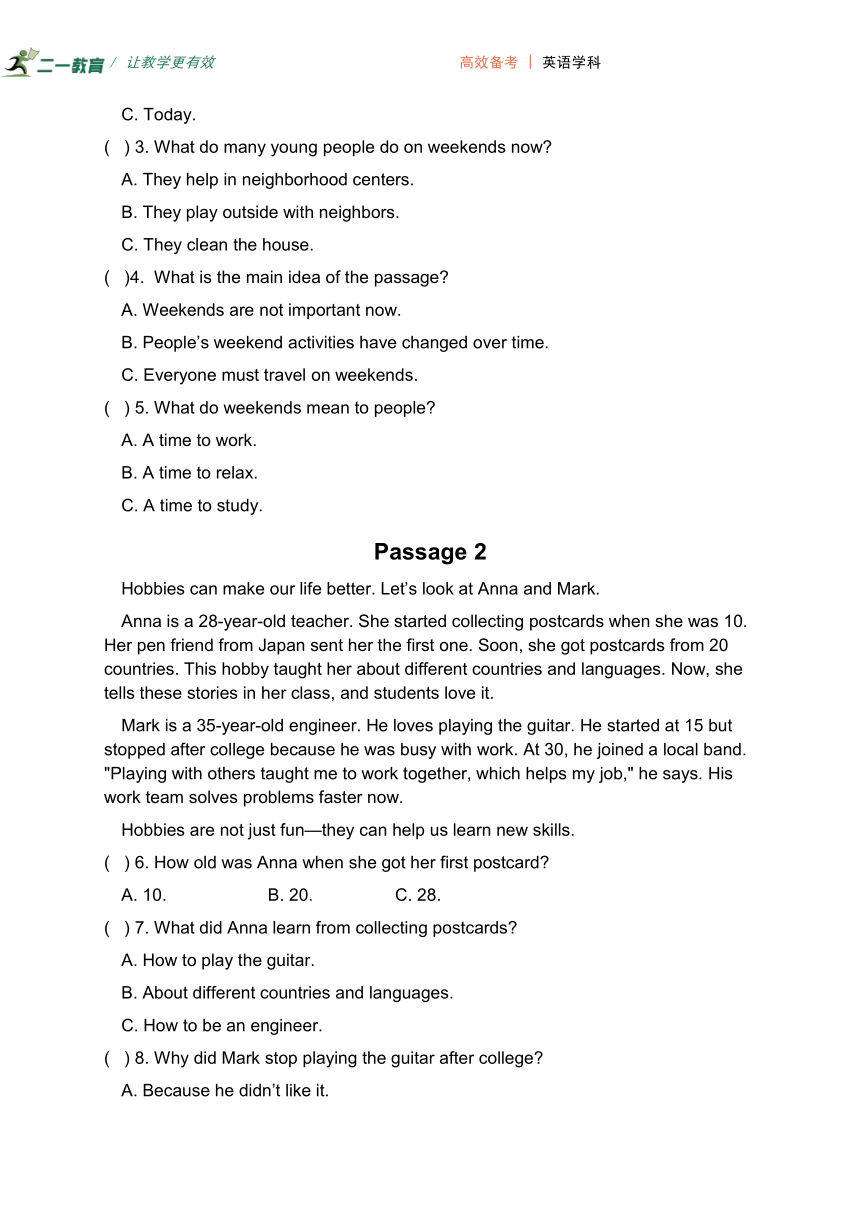
文档简介
/ 让教学更有效 高效备考 | 英语学科
四年级上册期末提升测试卷
一、语音题(10 分)
选出下列单词中划线部分发音不同的一项。
( ) 1. A. Thursday B. turn C. teacher
( ) 2. A. autumn B. laugh C. daughter
( ) 3. A. weather B. meat C. sweater
( ) 4. A. windy B. fly C. sunny
( ) 5. A. communication B. notice C. call
二、语法词汇选择题(30 分)
从 A、B、C 中选出最佳答案。
( ) 1. —______ season do you think is the most beautiful in your city
—Autumn. The leaves are colorful.
A. What B. Which C. Whose
( ) 2. If it ______ tomorrow, we ______ the picnic.
A. rains; will cancel B. will rain; cancel C. rains; cancel
( ) 3. My parents ______ in this town for 15 years, and they ______ many friends here.
A. live; make B. have lived; have made C. lived; made
( ) 4. —How long ______ you ______ collecting stamps
—For about three years.
A. do; like B. have; been C. did; start
( ) 5. The girl ______ a red dress over there ______ in the dancing competition last month.
A. wearing; won B. wears; wins C. worn; was winning
( ) 6. —Could you tell me ______ the online meeting
—At 2 p.m. next Monday.
A. when; starts B. when; will start C. where; starts
( ) 7. He ______ to be a doctor when he grows up because his father ______ as a doctor for 20 years.
A. wants; has worked B. wanted; worked C. will want; works
( ) 8. It's ______ colder today than yesterday. You'd better ______ a thick coat.
A. much; put on B. more; wear C. very; putting on
( ) 9. —I ______ to call you all morning, but your phone ______ busy.
—Sorry, I was in a meeting.
A. try; is B. tried; was C. have tried; has been
( ) 10. The students ______ in the park every Saturday, but last week they ______ because of the rain.
A. volunteer; didn't B. volunteer; don't C. volunteered; didn't
( ) 11. —What ______ your brother ______ like
—He is tall with short hair, and he is very helpful.
A. does; look B. is; look C. do; look
( ) 12. By the time we ______ at the mountain, it ______ heavily for an hour.
A. arrived; had rained B. arrive; rains C. will arrive; will rain
( ) 13. She prefers ______ letters to ______ emails because she thinks handwritten words are warmer.
A. write; send B. writing; sending C. to write; to send
( ) 14. — do you visit your grandparents
—Every other weekend. We ______ them next Sunday.
A. How often; will visit B. How long; visit C. How soon; visited
( ) 15. The number of students who ______ after-school clubs ______ increased by 20% this year.
A. joins; has B. join; has C. join; have
三、情景对话选择(10 分)
从 A、B、C、D 中选出最合适的应答句,其中一项为多余选项。
( ) 1. —I heard the weather will get much colder tomorrow.
—______
A. I'd better buy a new sweater then.
B. What's the temperature today
C. We can make snowmen if it snows.
D. I hope it won't rain.
( ) 2. —My brother has been collecting model cars for 5 years.
—______
A. How many model cars has he collected
B. Collecting model cars is a waste of time.
C. That's amazing! I also like collecting things.
D. He must be very patient.
( ) 3. —Our class will have a trip next month. Could you tell me ______
—Sure. It will be on the last Saturday of July.
A. where we will go B. when it will be C. how we will go D. who will join us
( ) 4. —Do you think online communication is better than face-to-face talks
—______
A. Online talks are faster, but face-to-face ones feel more real.
B. I use my phone to chat every day.
C. My parents prefer calling to texting.
D. Face-to-face talks take more time.
( ) 5. —The spring rain ______ for three days, and many roads are flooded.
—______
A. has lasted; That's terrible. We must be careful.
B. lasted; I like rainy days.
C. will last; It's good for crops.
D. lasts; The weather is changeable.
四、句型转换(10 分)
按要求改写句子。
They use video chats to talk with their relatives for 2 years.(对划线部分提问)
______ ______ ______ they ______ video chats to talk with their relatives
"I will send the card by post," said Lily.(改为宾语从句)
Lily said ______ ______ ______ the card by post.
He likes playing football more than reading books.(改为同义句)
He prefers playing football ______ ______ books.
People use phones to call their friends.(改为被动语态)
Phones ______ ______ to call their friends.
The girl has lived in this house since 2018.(合并为一句,保持句意不变)
The girl has lived in this house ______ ______ ______..
五、阅读理解(30 分)
阅读短文,选择最佳答案。
Passage 1
People’s weekends have changed a lot in 30 years. In the 1990s, families often stayed at home. Parents cleaned the house or cooked. Kids played outside with neighbors. On Sundays, many people visited grandparents and brought them cakes or fruits.
In the 2010s, weekends became more fun. Families went to big stores, parks, or watched movies. They liked outdoor activities like walking in mountains or riding bikes. Some people learned new things on weekends, such as cooking, drawing, or English.
Today, people do different things. Some stay at home to read or watch shows online. Some take short trips to nearby cities. Many young people help others on weekends, like looking after animals or working in neighborhood centers. No matter what they do, weekends are special time to relax.
( ) 1. What did families often do on weekends in the 1990s
A. They traveled to other cities.
B. They stayed at home or visited grandparents.
C. They learned to cook.
( ) 2. When did people start liking outdoor activities like walking in mountains
A. In the 1990s.
B. In the 2010s.
C. Today.
( ) 3. What do many young people do on weekends now
A. They help in neighborhood centers.
B. They play outside with neighbors.
C. They clean the house.
( )4. What is the main idea of the passage
A. Weekends are not important now.
B. People’s weekend activities have changed over time.
C. Everyone must travel on weekends.
( ) 5. What do weekends mean to people
A. A time to work.
B. A time to relax.
C. A time to study.
Passage 2
Hobbies can make our life better. Let’s look at Anna and Mark.
Anna is a 28-year-old teacher. She started collecting postcards when she was 10. Her pen friend from Japan sent her the first one. Soon, she got postcards from 20 countries. This hobby taught her about different countries and languages. Now, she tells these stories in her class, and students love it.
Mark is a 35-year-old engineer. He loves playing the guitar. He started at 15 but stopped after college because he was busy with work. At 30, he joined a local band. "Playing with others taught me to work together, which helps my job," he says. His work team solves problems faster now.
Hobbies are not just fun—they can help us learn new skills.
( ) 6. How old was Anna when she got her first postcard
A. 10. B. 20. C. 28.
( ) 7. What did Anna learn from collecting postcards
A. How to play the guitar.
B. About different countries and languages.
C. How to be an engineer.
( ) 8. Why did Mark stop playing the guitar after college
A. Because he didn’t like it.
B. Because he was busy with work.
C. Because he joined a band.
( ) 9. What did Mark learn from the band
A. To work together.
B. To cook.
C. To draw.
( ) 10. What can we learn from the passage
A. Hobbies are only for kids.
B. Hobbies can help with work.
C. Everyone must collect postcards.
Passage 3
Seasons change how people live and play.
In northern countries, winter is cold and days are short. People often stay inside, reading books or having family parties. Some like winter sports, such as skiing or ice skating. Stores sell more warm clothes and hot drinks. Schools sometimes close when it snows a lot.
Spring is warmer and days are longer. Farmers start planting vegetables. People go outside more—working in gardens, having picnics, or walking in mountains. Many schools take students to parks to see flowers open.
Summer is a busy time for trips. Families go to beaches or mountains for vacation. Outdoor concerts and parties are popular. In hot places, people stay cool by swimming, drinking cold drinks, or napping in the hottest time.
Autumn is when farmers pick crops. Markets have many fresh fruits and vegetables. People enjoy outdoor activities before it gets cold, like picking apples or walking to see colorful leaves.
( ) 11. What do people in northern countries often do in winter
A. They walk in mountains.
B. They stay inside or do winter sports.
C. They plant vegetables.
( ) 12. Why do schools in northern countries sometimes close in winter
A. Because it snows a lot.
B. Because it is hot.
C. Because students go on vacation.
( ) 13. What do farmers do in spring
A. They pick crops.
B. They plant vegetables.
C. They go on vacation.
( ) 14. When are outdoor concerts popular
A. In winter.
B. In summer.
C. In autumn.
( ) 15. What is the main idea of the passage
A. Seasons change every year.
B. People like summer more than winter.
C. Seasons affect how people live and play.
六、书面表达(10 分)
以 “Changes in My Hometown Over the Years” 为题,写一篇短文,至少 6 句。
要求:1. 描述家乡在季节活动、人们交流方式等方面的变化;2. 说明这些变化带来的影响;3. 表达对家乡变化的感受。
参考答案及解析
一、语音题
(1) C 解析:A、B 中 “ur” 发音为 / /,C 中 “er” 发音为 / /,故选 C。
(2) B 解析:A、C 中 “au” 发音为 / /,B 中 “augh” 发音为 /ɑ /,故选 B。
(3) B 解析:A、C 中 “ea” 发音为 /e/,B 中 “ea” 发音为 /i /,故选 B。
(4) B 解析:A、C 中 “y” 发音为 / /,B 中 “y” 发音为 /a /,故选 B。
(5) C 解析:A、B 中 “c” 发音为 /s/,C 中 “c” 发音为 /k/,故选 C。
二、语法词汇选择题
(1) B 解析:在多个季节中选择用 which,故选 B。
(2) A 解析:if 引导的条件状语从句,主句用将来时 will cancel,从句用现在时 rains,故选 A。
(3) B 解析:for 15 years 提示用现在完成时 have lived 和 have made,故选 B。
(4) B 解析:how long 提问时长,用现在完成时 have; been,故选 B。
(5) A 解析:现在分词 wearing 作定语,last month 提示用过去时 won,故选 A。
(6) B 解析:由答语时间可知询问时间,宾语从句用 will start,故选 B。
(7) A 解析:描述现在的愿望用 wants,for 20 years 提示用现在完成时 has worked,故选 A。
(8) A 解析:much 修饰比较级 colder,had better 后接动词原形 put on,故选 A。
(9) B 解析:“一早上打电话” 是过去的动作,用 tried 和 was,故选 B。
(10) A 解析:every Saturday 提示用一般现在时 volunteer,last week 提示用过去时 didn't,故选 A。
(11) A 解析:询问外貌用 “What does... look like ”,故选 A。
(12) A 解析:by the time 引导的从句用过去时 arrived,主句用过去完成时 had rained,故选 A。
(13) B 解析:prefer doing to doing 意为 “比起…… 更喜欢……”,故选 B。
(14) A 解析:how often 提问频率,next Sunday 提示用将来时 will visit,故选 A。
(15) B 解析:定语从句主语 students 是复数,用 join;the number of 作主语,谓语用 has,故选 B。
三、情景对话选择
(1) B 解析:对方说 “明天会冷很多”,B 选项 “今天气温多少” 与寒冷无关,是多余选项,其余选项均相关,故选 B。
(2) B 解析:对方说 “哥哥集模型车 5 年”,B 选项 “集模型车是浪费时间” 是负面评价,其余选项均为积极回应,故选 B。
(3) B 解析:由答语 “7 月最后一个周六” 可知询问时间,when it will be 符合,故选 B。
(4) B 解析:对方问 “线上交流是否比面对面好”,B 选项 “每天用手机聊天” 未对比,是多余选项,其余选项均对比,故选 B。
(5) A 解析:对方说 “春雨下了三天,路被淹”,A 选项 “已持续,太糟了,要小心” 符合语境,其余选项均不恰当,故选 A。
四、句型转换
(1) 答案:How long do; use解析:划线部分 “for 2 years” 表示 “持续 2 年”,是时间段,对时间段提问用 “How long(多久)”。原句是一般现在时,主语是 “they”,变疑问句时需加助动词 “do”,动词 “use” 用原形。因此答案为 “How long do; use”。
(2)答案:that she would send解析:直接引语变宾语从句时,需用 “that” 引导(可省略,但四年级常保留);第一人称 “I” 要随主句主语 “Lily” 改为 “she”;主句 “said” 是过去时,直接引语中的 “will” 要改为过去式 “would”;动词 “send” 保持原形。因此答案为 “that she would send”。
(3)答案:to reading解析:“like...more than...”(比起…… 更喜欢……)和 “prefer...to...”(比起…… 更喜欢……)是同义结构。“to” 是介词,后面接动词的 - ing 形式,因此 “reading books” 简化为 “reading”。答案为 “to reading”。
(4)答案:are used解析:被动语态的基本结构是 “be 动词 + 动词过去分词”。原句是一般现在时,主语 “phones” 是复数,be 动词用 “are”;“use” 的过去分词是 “used”。因此答案为 “are used”。
(5)答案:for 5 years解析:“since 2018”(自从 2018 年)表示从过去某一时间点到现在,可转换为 “for + 时间段”。假设现在是 2023 年,2023-2018=5,因此 “since 2018” 对应 “for 5 years”。答案为 “for 5 years”。
五、阅读理解
Passage 1
B 解析:原文第一段提到 “In the 1990s, families often stayed at home... Many people visited grandparents”,可知 90 年代家庭常待在家或看望祖父母,选 B。
B 解析:第二段说 “In the 2010s... Outdoor activities like hiking and cycling grew popular”,可知 2010 年代开始流行户外活动,选 B。
A 解析:第三段提到 “Many young people volunteer... helping at... community centers”,“community centers” 对应选项 A 的 “neighborhood centers”,选 A。
B 解析:文章按时间顺序讲了 90 年代、2010 年代和现在的周末活动变化,主旨是 “人们的周末活动随时间改变”,选 B。
B 解析:最后一句提到 “weekends remain a special time to relax”,可知周末是放松的时间,选 B。
Passage 2
A 解析:第二段明确说 “She started collecting postcards when she was 10. Her pen pal... sent her the first one”,可知 Anna 10 岁时收到第一张明信片,选 A。
B 解析:文中提到 “This hobby taught her about different cultures and languages”,“cultures” 对应 “countries”,选 B。
B 解析:第三段说 “he stopped after college because of work”,即因为工作忙停止弹吉他,选 B。
A 解析:Mark 说 “Playing with others taught me teamwork”,“teamwork” 即 “work together”,选 A。
B 解析:文中 Anna 的爱好帮助教学,Mark 的爱好帮助工作,可知 “爱好对工作有帮助”,选 B。
Passage 3
B 解析:第二段提到 “winter... People often stay indoors... Some take up winter sports”,可知冬天人们待在室内或做冬季运动,选 B。
A 解析:第二段最后说 “schools sometimes close when there's heavy snow”,“heavy snow” 即 “snows a lot”,选 A。
B 解析:第三段说 “Spring... Farmers start planting crops”,“crops” 对应 “vegetables”,选 B。
B 解析:第四段提到 “Summer... Outdoor concerts and festivals are popular”,可知夏季户外音乐会流行,选 B。
C 解析:文章开头说 “Seasons affect not only nature but also human activities”,即季节影响人类活动,选 C。
六、书面表达(范文)
My Hometown's Changes
My hometown has changed a lot over the years. The biggest changes are in the four seasons and how people talk to each other.
When I was little, in winter, people mostly stayed at home. They talked to each other in person. Now, they join winter sports groups. They ski and take videos, then share them online with friends.
In the past, spring was busy for farmers. They worked alone in the fields. But now, farmers use phones to learn how to plant crops. They can even talk to smart people far away for help.
These changes make life more fun. People are still close, even when they’re busy. Old things we love are kept, and new fun things are added. I’m happy my hometown is getting better and better!
四年级上册期末提升测试卷
一、语音题(10 分)
选出下列单词中划线部分发音不同的一项。
( ) 1. A. Thursday B. turn C. teacher
( ) 2. A. autumn B. laugh C. daughter
( ) 3. A. weather B. meat C. sweater
( ) 4. A. windy B. fly C. sunny
( ) 5. A. communication B. notice C. call
二、语法词汇选择题(30 分)
从 A、B、C 中选出最佳答案。
( ) 1. —______ season do you think is the most beautiful in your city
—Autumn. The leaves are colorful.
A. What B. Which C. Whose
( ) 2. If it ______ tomorrow, we ______ the picnic.
A. rains; will cancel B. will rain; cancel C. rains; cancel
( ) 3. My parents ______ in this town for 15 years, and they ______ many friends here.
A. live; make B. have lived; have made C. lived; made
( ) 4. —How long ______ you ______ collecting stamps
—For about three years.
A. do; like B. have; been C. did; start
( ) 5. The girl ______ a red dress over there ______ in the dancing competition last month.
A. wearing; won B. wears; wins C. worn; was winning
( ) 6. —Could you tell me ______ the online meeting
—At 2 p.m. next Monday.
A. when; starts B. when; will start C. where; starts
( ) 7. He ______ to be a doctor when he grows up because his father ______ as a doctor for 20 years.
A. wants; has worked B. wanted; worked C. will want; works
( ) 8. It's ______ colder today than yesterday. You'd better ______ a thick coat.
A. much; put on B. more; wear C. very; putting on
( ) 9. —I ______ to call you all morning, but your phone ______ busy.
—Sorry, I was in a meeting.
A. try; is B. tried; was C. have tried; has been
( ) 10. The students ______ in the park every Saturday, but last week they ______ because of the rain.
A. volunteer; didn't B. volunteer; don't C. volunteered; didn't
( ) 11. —What ______ your brother ______ like
—He is tall with short hair, and he is very helpful.
A. does; look B. is; look C. do; look
( ) 12. By the time we ______ at the mountain, it ______ heavily for an hour.
A. arrived; had rained B. arrive; rains C. will arrive; will rain
( ) 13. She prefers ______ letters to ______ emails because she thinks handwritten words are warmer.
A. write; send B. writing; sending C. to write; to send
( ) 14. — do you visit your grandparents
—Every other weekend. We ______ them next Sunday.
A. How often; will visit B. How long; visit C. How soon; visited
( ) 15. The number of students who ______ after-school clubs ______ increased by 20% this year.
A. joins; has B. join; has C. join; have
三、情景对话选择(10 分)
从 A、B、C、D 中选出最合适的应答句,其中一项为多余选项。
( ) 1. —I heard the weather will get much colder tomorrow.
—______
A. I'd better buy a new sweater then.
B. What's the temperature today
C. We can make snowmen if it snows.
D. I hope it won't rain.
( ) 2. —My brother has been collecting model cars for 5 years.
—______
A. How many model cars has he collected
B. Collecting model cars is a waste of time.
C. That's amazing! I also like collecting things.
D. He must be very patient.
( ) 3. —Our class will have a trip next month. Could you tell me ______
—Sure. It will be on the last Saturday of July.
A. where we will go B. when it will be C. how we will go D. who will join us
( ) 4. —Do you think online communication is better than face-to-face talks
—______
A. Online talks are faster, but face-to-face ones feel more real.
B. I use my phone to chat every day.
C. My parents prefer calling to texting.
D. Face-to-face talks take more time.
( ) 5. —The spring rain ______ for three days, and many roads are flooded.
—______
A. has lasted; That's terrible. We must be careful.
B. lasted; I like rainy days.
C. will last; It's good for crops.
D. lasts; The weather is changeable.
四、句型转换(10 分)
按要求改写句子。
They use video chats to talk with their relatives for 2 years.(对划线部分提问)
______ ______ ______ they ______ video chats to talk with their relatives
"I will send the card by post," said Lily.(改为宾语从句)
Lily said ______ ______ ______ the card by post.
He likes playing football more than reading books.(改为同义句)
He prefers playing football ______ ______ books.
People use phones to call their friends.(改为被动语态)
Phones ______ ______ to call their friends.
The girl has lived in this house since 2018.(合并为一句,保持句意不变)
The girl has lived in this house ______ ______ ______..
五、阅读理解(30 分)
阅读短文,选择最佳答案。
Passage 1
People’s weekends have changed a lot in 30 years. In the 1990s, families often stayed at home. Parents cleaned the house or cooked. Kids played outside with neighbors. On Sundays, many people visited grandparents and brought them cakes or fruits.
In the 2010s, weekends became more fun. Families went to big stores, parks, or watched movies. They liked outdoor activities like walking in mountains or riding bikes. Some people learned new things on weekends, such as cooking, drawing, or English.
Today, people do different things. Some stay at home to read or watch shows online. Some take short trips to nearby cities. Many young people help others on weekends, like looking after animals or working in neighborhood centers. No matter what they do, weekends are special time to relax.
( ) 1. What did families often do on weekends in the 1990s
A. They traveled to other cities.
B. They stayed at home or visited grandparents.
C. They learned to cook.
( ) 2. When did people start liking outdoor activities like walking in mountains
A. In the 1990s.
B. In the 2010s.
C. Today.
( ) 3. What do many young people do on weekends now
A. They help in neighborhood centers.
B. They play outside with neighbors.
C. They clean the house.
( )4. What is the main idea of the passage
A. Weekends are not important now.
B. People’s weekend activities have changed over time.
C. Everyone must travel on weekends.
( ) 5. What do weekends mean to people
A. A time to work.
B. A time to relax.
C. A time to study.
Passage 2
Hobbies can make our life better. Let’s look at Anna and Mark.
Anna is a 28-year-old teacher. She started collecting postcards when she was 10. Her pen friend from Japan sent her the first one. Soon, she got postcards from 20 countries. This hobby taught her about different countries and languages. Now, she tells these stories in her class, and students love it.
Mark is a 35-year-old engineer. He loves playing the guitar. He started at 15 but stopped after college because he was busy with work. At 30, he joined a local band. "Playing with others taught me to work together, which helps my job," he says. His work team solves problems faster now.
Hobbies are not just fun—they can help us learn new skills.
( ) 6. How old was Anna when she got her first postcard
A. 10. B. 20. C. 28.
( ) 7. What did Anna learn from collecting postcards
A. How to play the guitar.
B. About different countries and languages.
C. How to be an engineer.
( ) 8. Why did Mark stop playing the guitar after college
A. Because he didn’t like it.
B. Because he was busy with work.
C. Because he joined a band.
( ) 9. What did Mark learn from the band
A. To work together.
B. To cook.
C. To draw.
( ) 10. What can we learn from the passage
A. Hobbies are only for kids.
B. Hobbies can help with work.
C. Everyone must collect postcards.
Passage 3
Seasons change how people live and play.
In northern countries, winter is cold and days are short. People often stay inside, reading books or having family parties. Some like winter sports, such as skiing or ice skating. Stores sell more warm clothes and hot drinks. Schools sometimes close when it snows a lot.
Spring is warmer and days are longer. Farmers start planting vegetables. People go outside more—working in gardens, having picnics, or walking in mountains. Many schools take students to parks to see flowers open.
Summer is a busy time for trips. Families go to beaches or mountains for vacation. Outdoor concerts and parties are popular. In hot places, people stay cool by swimming, drinking cold drinks, or napping in the hottest time.
Autumn is when farmers pick crops. Markets have many fresh fruits and vegetables. People enjoy outdoor activities before it gets cold, like picking apples or walking to see colorful leaves.
( ) 11. What do people in northern countries often do in winter
A. They walk in mountains.
B. They stay inside or do winter sports.
C. They plant vegetables.
( ) 12. Why do schools in northern countries sometimes close in winter
A. Because it snows a lot.
B. Because it is hot.
C. Because students go on vacation.
( ) 13. What do farmers do in spring
A. They pick crops.
B. They plant vegetables.
C. They go on vacation.
( ) 14. When are outdoor concerts popular
A. In winter.
B. In summer.
C. In autumn.
( ) 15. What is the main idea of the passage
A. Seasons change every year.
B. People like summer more than winter.
C. Seasons affect how people live and play.
六、书面表达(10 分)
以 “Changes in My Hometown Over the Years” 为题,写一篇短文,至少 6 句。
要求:1. 描述家乡在季节活动、人们交流方式等方面的变化;2. 说明这些变化带来的影响;3. 表达对家乡变化的感受。
参考答案及解析
一、语音题
(1) C 解析:A、B 中 “ur” 发音为 / /,C 中 “er” 发音为 / /,故选 C。
(2) B 解析:A、C 中 “au” 发音为 / /,B 中 “augh” 发音为 /ɑ /,故选 B。
(3) B 解析:A、C 中 “ea” 发音为 /e/,B 中 “ea” 发音为 /i /,故选 B。
(4) B 解析:A、C 中 “y” 发音为 / /,B 中 “y” 发音为 /a /,故选 B。
(5) C 解析:A、B 中 “c” 发音为 /s/,C 中 “c” 发音为 /k/,故选 C。
二、语法词汇选择题
(1) B 解析:在多个季节中选择用 which,故选 B。
(2) A 解析:if 引导的条件状语从句,主句用将来时 will cancel,从句用现在时 rains,故选 A。
(3) B 解析:for 15 years 提示用现在完成时 have lived 和 have made,故选 B。
(4) B 解析:how long 提问时长,用现在完成时 have; been,故选 B。
(5) A 解析:现在分词 wearing 作定语,last month 提示用过去时 won,故选 A。
(6) B 解析:由答语时间可知询问时间,宾语从句用 will start,故选 B。
(7) A 解析:描述现在的愿望用 wants,for 20 years 提示用现在完成时 has worked,故选 A。
(8) A 解析:much 修饰比较级 colder,had better 后接动词原形 put on,故选 A。
(9) B 解析:“一早上打电话” 是过去的动作,用 tried 和 was,故选 B。
(10) A 解析:every Saturday 提示用一般现在时 volunteer,last week 提示用过去时 didn't,故选 A。
(11) A 解析:询问外貌用 “What does... look like ”,故选 A。
(12) A 解析:by the time 引导的从句用过去时 arrived,主句用过去完成时 had rained,故选 A。
(13) B 解析:prefer doing to doing 意为 “比起…… 更喜欢……”,故选 B。
(14) A 解析:how often 提问频率,next Sunday 提示用将来时 will visit,故选 A。
(15) B 解析:定语从句主语 students 是复数,用 join;the number of 作主语,谓语用 has,故选 B。
三、情景对话选择
(1) B 解析:对方说 “明天会冷很多”,B 选项 “今天气温多少” 与寒冷无关,是多余选项,其余选项均相关,故选 B。
(2) B 解析:对方说 “哥哥集模型车 5 年”,B 选项 “集模型车是浪费时间” 是负面评价,其余选项均为积极回应,故选 B。
(3) B 解析:由答语 “7 月最后一个周六” 可知询问时间,when it will be 符合,故选 B。
(4) B 解析:对方问 “线上交流是否比面对面好”,B 选项 “每天用手机聊天” 未对比,是多余选项,其余选项均对比,故选 B。
(5) A 解析:对方说 “春雨下了三天,路被淹”,A 选项 “已持续,太糟了,要小心” 符合语境,其余选项均不恰当,故选 A。
四、句型转换
(1) 答案:How long do; use解析:划线部分 “for 2 years” 表示 “持续 2 年”,是时间段,对时间段提问用 “How long(多久)”。原句是一般现在时,主语是 “they”,变疑问句时需加助动词 “do”,动词 “use” 用原形。因此答案为 “How long do; use”。
(2)答案:that she would send解析:直接引语变宾语从句时,需用 “that” 引导(可省略,但四年级常保留);第一人称 “I” 要随主句主语 “Lily” 改为 “she”;主句 “said” 是过去时,直接引语中的 “will” 要改为过去式 “would”;动词 “send” 保持原形。因此答案为 “that she would send”。
(3)答案:to reading解析:“like...more than...”(比起…… 更喜欢……)和 “prefer...to...”(比起…… 更喜欢……)是同义结构。“to” 是介词,后面接动词的 - ing 形式,因此 “reading books” 简化为 “reading”。答案为 “to reading”。
(4)答案:are used解析:被动语态的基本结构是 “be 动词 + 动词过去分词”。原句是一般现在时,主语 “phones” 是复数,be 动词用 “are”;“use” 的过去分词是 “used”。因此答案为 “are used”。
(5)答案:for 5 years解析:“since 2018”(自从 2018 年)表示从过去某一时间点到现在,可转换为 “for + 时间段”。假设现在是 2023 年,2023-2018=5,因此 “since 2018” 对应 “for 5 years”。答案为 “for 5 years”。
五、阅读理解
Passage 1
B 解析:原文第一段提到 “In the 1990s, families often stayed at home... Many people visited grandparents”,可知 90 年代家庭常待在家或看望祖父母,选 B。
B 解析:第二段说 “In the 2010s... Outdoor activities like hiking and cycling grew popular”,可知 2010 年代开始流行户外活动,选 B。
A 解析:第三段提到 “Many young people volunteer... helping at... community centers”,“community centers” 对应选项 A 的 “neighborhood centers”,选 A。
B 解析:文章按时间顺序讲了 90 年代、2010 年代和现在的周末活动变化,主旨是 “人们的周末活动随时间改变”,选 B。
B 解析:最后一句提到 “weekends remain a special time to relax”,可知周末是放松的时间,选 B。
Passage 2
A 解析:第二段明确说 “She started collecting postcards when she was 10. Her pen pal... sent her the first one”,可知 Anna 10 岁时收到第一张明信片,选 A。
B 解析:文中提到 “This hobby taught her about different cultures and languages”,“cultures” 对应 “countries”,选 B。
B 解析:第三段说 “he stopped after college because of work”,即因为工作忙停止弹吉他,选 B。
A 解析:Mark 说 “Playing with others taught me teamwork”,“teamwork” 即 “work together”,选 A。
B 解析:文中 Anna 的爱好帮助教学,Mark 的爱好帮助工作,可知 “爱好对工作有帮助”,选 B。
Passage 3
B 解析:第二段提到 “winter... People often stay indoors... Some take up winter sports”,可知冬天人们待在室内或做冬季运动,选 B。
A 解析:第二段最后说 “schools sometimes close when there's heavy snow”,“heavy snow” 即 “snows a lot”,选 A。
B 解析:第三段说 “Spring... Farmers start planting crops”,“crops” 对应 “vegetables”,选 B。
B 解析:第四段提到 “Summer... Outdoor concerts and festivals are popular”,可知夏季户外音乐会流行,选 B。
C 解析:文章开头说 “Seasons affect not only nature but also human activities”,即季节影响人类活动,选 C。
六、书面表达(范文)
My Hometown's Changes
My hometown has changed a lot over the years. The biggest changes are in the four seasons and how people talk to each other.
When I was little, in winter, people mostly stayed at home. They talked to each other in person. Now, they join winter sports groups. They ski and take videos, then share them online with friends.
In the past, spring was busy for farmers. They worked alone in the fields. But now, farmers use phones to learn how to plant crops. They can even talk to smart people far away for help.
These changes make life more fun. People are still close, even when they’re busy. Old things we love are kept, and new fun things are added. I’m happy my hometown is getting better and better!
同课章节目录
